2015年高考英语全国卷D 翻译
- 格式:doc
- 大小:29.00 KB
- 文档页数:3
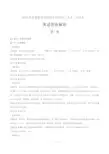
2015年普通高等学校招生全国统一考试(四川卷)英语答案解析第Ⅰ卷第一部分英语知识运用第一节单项填空1.【答案】C【解析】“对不起,我忘记锁门了。
”,“问题不大,Mike稍后来关”。
A项“没门”。
B项“别着急”(安慰人慢慢做事)。
D项“不用谢,不客气”。
【提示】熟悉中西方不同文化的交际习惯。
【考点】情景交际。
2.【答案】A【解析】“你(必须)得小心摆弄相机,它老贵了!”。
B项“可能”,C项“能够”,D项“将要”【提示】掌握情态动词的基本用法及特殊用法。
【考点】情态动词。
3.【答案】C【解析】“放在桌子上的那些封面闪闪放光的书是给我们准备的奖的品。
”从句为主系表结构,不缺成分,故排除B。
D项that不能引导非限,制定语从句,排除。
此题难度在于先行词和从句被状语on the desk分开,并且使用了逗号,粗心的考生没有注意看从句结构,从而误选A。
正解:The books' covers,先行词做covers的定语,翻译成:书的封面。
毫不犹豫选择C项whose。
【提示】定语从句是高考热点和难点。
要求考生能正确查找先行词,分析其与从句间的关系。
要求学生具备正确分析句子的能力。
【考点】定语从句。
4.【答案】B【解析】“在四川,更多的高速路将很快被建成,用以提升当地经济。
”动词时态语态题的最大突破口为时间状语,从soon一词可以看出应该是很快(即将来)的意思,选择将来时的被动语态。
【提示】掌握动词时态语态题做题方法,正确判断表时间的状语,分析句子中暗藏的时间关系。
【考点】动词时态,语态。
5.【答案】A【解析】像名人一类的人或者用名人代替其作品,正确的做法一律是在其名字前加上冠词a/an。
【提示】把握冠词的基础用法和特殊用法。
【考点】冠词。
6.【答案】D【解析】“在你最喜欢的乐队现场表演前,就剩一天时间了。
”A项“自从…,以来”明显错误。
B项“直到…”。
C项“当…的时候”,D项“在…前”。
此题用翻译法做。
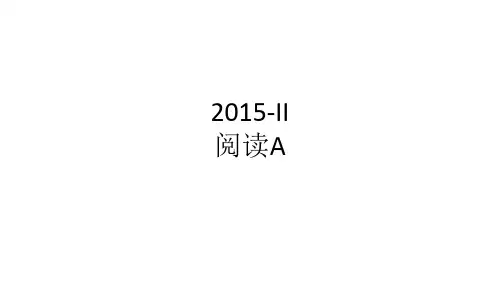
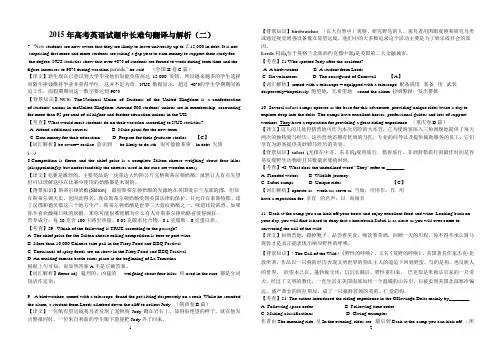
2015年高考英语试题中长难句翻译与解析(二)7. “New students are now aware that they are likely to leave university up to £15,000 in debt. It is not surprising that more and more students are taking a gap year to earn money to support their study for the degree. NUS statistics show that over 40% of students are forced to work during term time and the figure increases to 90% during vacation periods,” he said. (全国II卷C篇)【译文】新生现在已意识到大学毕业他们很能负债高达15,000英镑,所以越来越多的学生选择间隔年挣钱维持学业并获得学位,这并不足为奇。
NUS数据显示,超过40%的学生学期期间被迫工作,而假期期间这一数字要达到90%.【背景知识】NUS: The National Union of Students of the United Kingdom is a confederation of students' unions in theUnited Kingdom. Around 600 students' unions are in membership, accounting for more than 95 per cent of all higher and further education unions in the UK.【考查】What would most students do on their vacation according to NUS statistics?A. Attend additional courses.B. Make plans for the new term.C. Earn money for their education.D. Prepare for their graduate studies. 【C】【词汇解析】be aware= realize 意识到be likely to do sth. 很可能做某事in debt 欠债(二)petition is fierce and the chief prize is a complete Stilton cheese weighing about four kilos (disappointingly, but understandably the cheeses used in the race are wooden ones).【译文】竞赛是激烈的。
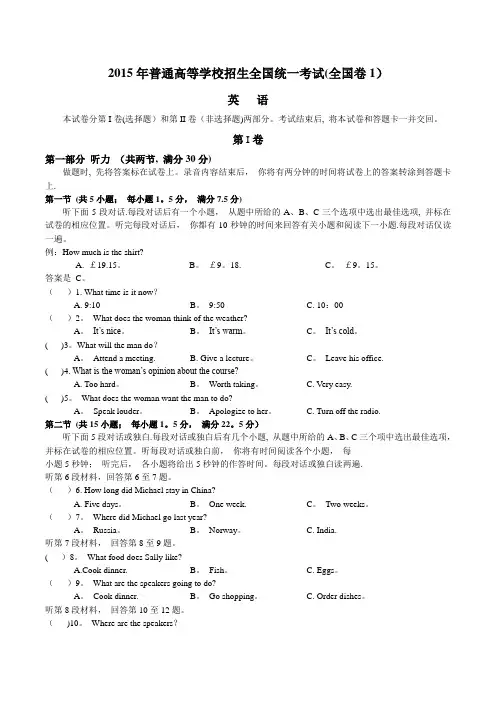
2015年普通高等学校招生全国统一考试(全国卷1)英语本试卷分第I卷(选择题)和第II卷(非选择题)两部分。
考试结束后, 将本试卷和答题卡一并交回。
第I卷第一部分听力(共两节, 满分30分)做题时, 先将答案标在试卷上。
录音内容结束后,你将有两分钟的时间将试卷上的答案转涂到答题卡上.第一节(共5小题;每小题1。
5分,满分7.5分)听下面5段对话.每段对话后有一个小题,从题中所给的A、B、C三个选项中选出最佳选项, 并标在试卷的相应位置。
听完每段对话后,你都有10秒钟的时间来回答有关小题和阅读下一小题.每段对话仅读一遍。
例:How much is the shirt?A. £19.15。
B。
£9。
18. C。
£9。
15。
答案是C。
()1. What time is it now?A. 9:10 B。
9:50 C. 10:00()2。
What does the woman think of the weather?A。
It’s nice。
B。
It’s warm。
C。
It’s cold。
( )3。
What will the man do?A。
Attend a meeting. B. Give a lecture。
C。
Leave his office.( )4. What is the woman’s opinion about the course?A. Too hard。
B。
Worth taking。
C. Very easy.( )5。
What does the woman want the man to do?A。
Speak louder。
B。
Apologize to her。
C. Turn off the radio.第二节(共15小题;每小题1。
5分,满分22。
5分)听下面5段对话或独白.每段对话或独白后有几个小题, 从题中所给的A、B、C三个项中选出最佳选项,并标在试卷的相应位置。
听每段对话或独白前,你将有时间阅读各个小题,每小题5秒钟;听完后,各小题将给出5秒钟的作答时间。
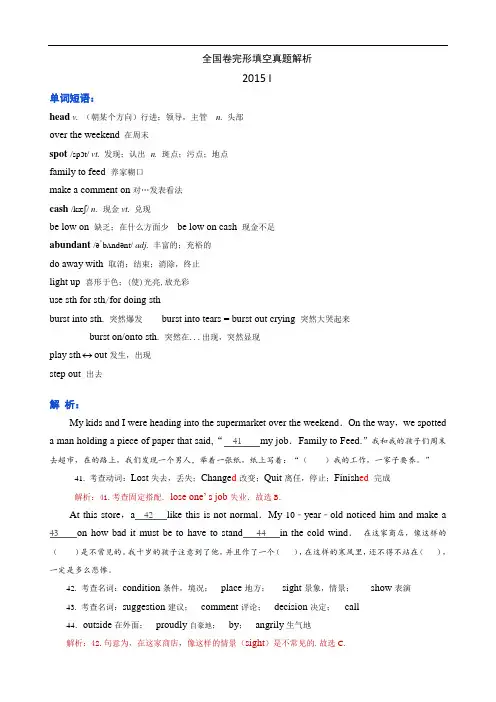
全国卷完形填空真题解析2015 I单词短语:head v. (朝某个方向)行进;领导,主管n. 头部over the weekend在周末spot/spɔt/ vt.发现;认出n. 斑点;污点;地点family to feed 养家糊口make a comment on对…发表看法cash /kæʃ/ n.现金vt. 兑现be low on 缺乏;在什么方面少be low on cash 现金不足abundant /əˈbʌndənt/ adj.丰富的;充裕的do away with 取消;结束;消除,终止light up 喜形于色;(使)光亮,放光彩use sth for sth/for doing sthburst into sth. 突然爆发burst into tears = burst out crying 突然大哭起来burst on/onto sth. 突然在...出现,突然显现play sth out发生,出现step out 出去解析:My kids and I were heading into the supermarket over the weekend.On the way,we spotted a man holding a piece of paper that said,“41 my job.Family to Feed.”我和我的孩子们周末去超市,在的路上,我们发现一个男人,举着一张纸,纸上写着:“()我的工作,一家子要养。
”41. 考查动词:Lost失去,丢失;Change d改变;Quit离任,停止;Finish ed 完成解析:41.考查固定搭配. lose one’ s job失业.故选B.At this store,a42 like this is not normal.My 10﹣year﹣old noticed him and make a 43 on how bad it must be to have to stand44 in the cold wind.在这家商店,像这样的()是不常见的。
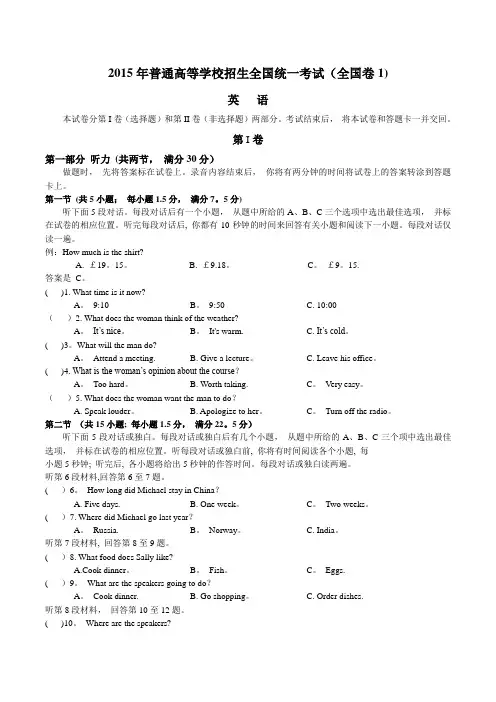
2015年普通高等学校招生全国统一考试(全国卷1)英语本试卷分第I卷(选择题)和第II卷(非选择题)两部分。
考试结束后,将本试卷和答题卡一并交回。
第I卷第一部分听力(共两节,满分30分)做题时,先将答案标在试卷上。
录音内容结束后,你将有两分钟的时间将试卷上的答案转涂到答题卡上。
第一节(共5小题;每小题1.5分,满分7。
5分)听下面5段对话。
每段对话后有一个小题,从题中所给的A、B、C三个选项中选出最佳选项,并标在试卷的相应位置。
听完每段对话后, 你都有10秒钟的时间来回答有关小题和阅读下一小题。
每段对话仅读一遍。
例:How much is the shirt?A. £19。
15。
B. £9.18。
C。
£9。
15.答案是C。
( )1. What time is it now?A。
9:10 B。
9:50 C. 10:00()2. What does the woman think of the weather?A。
It’s nice。
B。
It's warm. C. It’s cold。
( )3。
What will the man do?A。
Attend a meeting. B. Give a lecture。
C. Leave his office。
( )4. What is the woman’s opinion about the course?A。
Too hard。
B. Worth taking. C。
Very easy。
()5. What does the woman want the man to do?A. Speak louder。
B. Apologize to her。
C。
Turn off the radio。
第二节(共15小题; 每小题1.5分,满分22。
5分)听下面5段对话或独白。
每段对话或独白后有几个小题,从题中所给的A、B、C三个项中选出最佳选项,并标在试卷的相应位置。
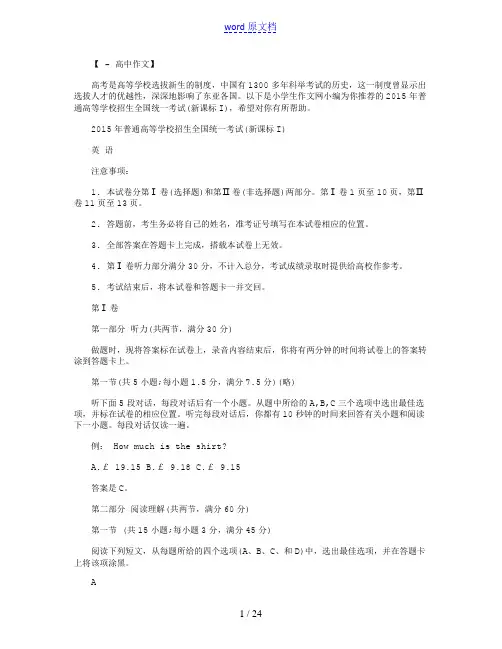
【 - 高中作文】高考是高等学校选拔新生的制度,中国有1300多年科举考试的历史,这一制度曾显示出选拔人才的优越性,深深地影响了东亚各国。
以下是小学生作文网小编为你推荐的2015年普通高等学校招生全国统一考试(新课标I),希望对你有所帮助。
2015年普通高等学校招生全国统一考试(新课标I)英语注意事项:1. 本试卷分第Ⅰ卷(选择题)和第Ⅱ卷(非选择题)两部分。
第Ⅰ卷1页至10页,第Ⅱ卷11页至13页。
2. 答题前,考生务必将自己的姓名,准考证号填写在本试卷相应的位置。
3. 全部答案在答题卡上完成,搭载本试卷上无效。
4. 第Ⅰ卷听力部分满分30分,不计入总分,考试成绩录取时提供给高校作参考。
5. 考试结束后,将本试卷和答题卡一并交回。
第Ⅰ卷第一部分听力(共两节,满分30分)做题时,现将答案标在试卷上,录音内容结束后,你将有两分钟的时间将试卷上的答案转涂到答题卡上。
第一节(共5小题;每小题1.5分,满分7.5分)(略)听下面5段对话,每段对话后有一个小题。
从题中所给的A,B,C三个选项中选出最佳选项,并标在试卷的相应位置。
听完每段对话后,你都有10秒钟的时间来回答有关小题和阅读下一小题。
每段对话仅读一遍。
例: How much is the shirt?A.£ 19.15B.£ 9.18C.£ 9.15答案是C。
第二部分阅读理解(共两节,满分60分)第一节 (共15小题;每小题3分,满分45分)阅读下列短文,从每题所给的四个选项(A、B、C、和D)中,选出最佳选项,并在答题卡上将该项涂黑。
AMonthly Talks at London Canal MuseumOur monthly talks start at 19:30 on the first Thursday of each month except August. Admission is at normal charges and you don’t need to book. They end around 21:00.November 7thThe Canal Pioneers, by Chris Lewis. James Brindley is recognized as one of the leading early canal engineers. He was also a major player in training others in the art of nanal planning and building. Chris Lewis will explain how Brindley made such a positivecontribution to the ed ucation of that group of early “civil enginerrs”.December 5thIce for the Metropolis, by Malcolm Tucker. Well before thearrival of freezers, there was a demand for ice for foodpreservation and catering, Malcolm will explain the history of importing natural ice and the technology of building ice wells, and how London’s ice trade grew.February 6thAn Update on the Cotsword Canals, by Liz Payne. The Smoudwater Canal is moving towards reopenling. The Thames and Severn Canal will take a little longer. We will have a report on the present state of play.March 6thEyots and Aits- Thames Islands, by Miranda Vickers. The Thames had many islands. Miranda has undertaken a review of all of them. She will tell us about those of greatest interest.Online bookings:More into:London Canal Museum12-13 New Wharf Road, London NI 9RTTel:020 ********21.When is the talk on James Brindley?A. February 6th.B. March 6th.C. November 7th.D. December 5th.22. What is the topic of the talk in February?A. The Canal Pioneers.B. Ice for the MetropolisC. Eyots and Aits- Thames IslandsD. An Update on the Cotsword Canals23. Who will give the talk on the islands in the Thames.A. Miranda VickersB. Malcolm TuckerC. Chris LewisD. Liz PayneBThe freezing Northeast hasn’t been a terribly fun place to spend time this winter, so when the chance came for a weekend to Sarasota, Florida, my bags were packed before you could say “sunshine”. I l eft for the land of warmth and vitamin C(维生素C), thinking of beachesand orange trees. When we touched down to blue skies and warm air, I sent up a small prayer of gratefulness. Swimming pools, wine tasting, and pink sunsets(at normal evening hours, not 4 in the afternoon)filled the weekend, but the best part- particularly to my taste,dulled by months of cold- weather root vegetables- was a 7 a.m. adventure to the Sarasota farmers’ market that proved to be morethan worth the early wake-up call.The market, which was founded in 1979, sets up its tents every Saturday from 7:00 am to 1 p.m, rain or shine, along North Lemon and State streets. Baskets of perfect red strawberries, the red-painted sides of the Java Dawg coffee truck; and most of all, the tomatoes: amazing, large, soft and round red tomatoes.Disappointed by many a broken, vine-ripened(蔓上成熟的) promise,I’ve refused to buy winter tomatoes for years. No matter howattractive they look in the store, once I get them home they’re unfailingly dry, hard, and tasteless. But I homed in, withuncertainty, on one particular table at the Brown’s Grove Farm’s stand, full of fresh and soft tomatoes the size of my fist. Thesewere the real deal- and at that moment, I realized that the bestpart of Sarasota in winter was going to be eating things that back home in New York I wouldn’t be experiencing again for months.Delighted as I was by the tomatoes in sight, my happinessdeepened when I learned that Brown’s Grove Farm is one of thesuppliers for Jack Dusty, a newly opened restaurant at the Sarasota Ritz Carlton, where- luckily for me- I was planning to have dinnerthat very night. Without even seeing the menu, I knew I’d beordering every tomato on it.24. What did the author think of her winter life in New York?A. Exciting.B. Boring.C. Relaxing.D. Annoying.25. What made the author’s getting up late early worthwhile?A. Having a swim.B. Breathing in fresh air.C. Walking in the morning sun.D. Visiting a local farmer’s market.26. What can we learn about tomatoes sold in New York in winter?A. They are soft.B. They look nice.C. They taste great.D. They are juicy.27. What was the author going to that evening?A. Go to a farm.B. Check into a hotel.C. Eat in a restaurant.D. Buy fresh vegatables.CSalvador Dali (1904-1989) was one of the most popular of modern artists. The Pompidou Centre in Paris is showing its respect and admiration for the artist and his powerful personality with an exhibition bringing together over 200 paintings, sculptures,drawings and more. Among the works and masterworks on exhibition the visitor will find the best pieces, most importantly The Persistenceof Memory. There is also L’Enigme sans Fin from 1938, works on pa per, objects, and projects for stage and screen and selected parts from television programmes reflecting the artist’s showman qualities.The visitor will enter the World of Dali through an egg and is met with the beginning, the world of birth. The exhibition follows a path of time and subject with the visitor exiting through the brain.The exhibition shows how Dali draws the viewer between two infinities (无限). “From the infinity small to the infinity large, contraction and expansion coming in and out of focus: amazingFlemish accuracy and the showy Baroque of old painting that he used in his museum-theatre in Figueras,” explains the Pompidou Centre.The fine selection of the major works was done in close collaboration (合作)with the Museo Nacional Reina Sofia in Madrid, Spain, and with contributions from other institutions like the Salvador Dali Museum in St. Petersburg.28. Which of the following best describe Dali according to Paragraph 1?A. Optimistic.B. ProductiveC. Generous.D. Traditional.29. What is Dali’s The Persistence of Memory considered to be?A. One of his masterworks.B. A successful screen adaptation.C. An artistic creation for the stage.D. One of the beat TV programmes.30. How are the exhibits arranged at the World of Dali?A. By popularity.B. By importance.C. By size and shape.D. By time and subject.31. What does the word “contributions” in the last paragraphrefer to?A. Artworks.B. Projects.C. Donations.D. Documents.DConflict is on the menu tonight at the café La Chope. This evening, as on every Thursday night, psychologist Maud Lehanne is leading two of France’s favorite pastimes, coffee drinking and the “talking cure”. Here they are learning to get in touch with th eir true feelings. It isn’t always easy. They customers-some thirty Parisians who pay just under $2 (plus drinks) per session-care quick to intellectualize (高谈阔论),slow to open up and connect. “You areforbidden to say ‘one feels,’ or ‘people think’,”Lehane told them. “Say ‘I think,’ ‘Think me’.”A café society where no intellectualizing is allowed? It couldn’t seem more un-French. But Lehanne’s psychology café is about morethan knowing oneself: It’s trying to help the city’s troubled neighborhood cafes. Over the years, Parisian cafes have fallenvictim to changes in the French lifestyle-longer working hours, afast food boom and a younger generation’s desire to spend more time at home. Dozens of new theme cafes appear to change the situation. Cafes focused around psychology, history, and engineering arecatching on, filling tables well into the evening.32.What are people encouraged to do at the cafe La Chope?A. Learn a new subjectB. Keep in touch with friends.C. Show off their knowledge.D. Express their true feelings.33. How are cafes affected by French lifestyle changes?A. They are less frequently visited.B. They stay open for longer hours.C. They have bigger night crowds.D. They start to serve fast food.34. What are theme cafes expected to do?A. Create more jobs.B. Supply better drinks.C. Save the cafe business.D. Serve the neighborhood.35. Why are psychology cafes becoming popular in Paris?A. They bring people true friendship.B. They give people spiritual support.C. They help people realize their dreams.D. They offer a platform for business links.第二节 (共5小题,每小题2分,满分10分)根据短文内容,从短文后的选项中选出能填入空白处的最佳选项,选项中有两项为多余选项。
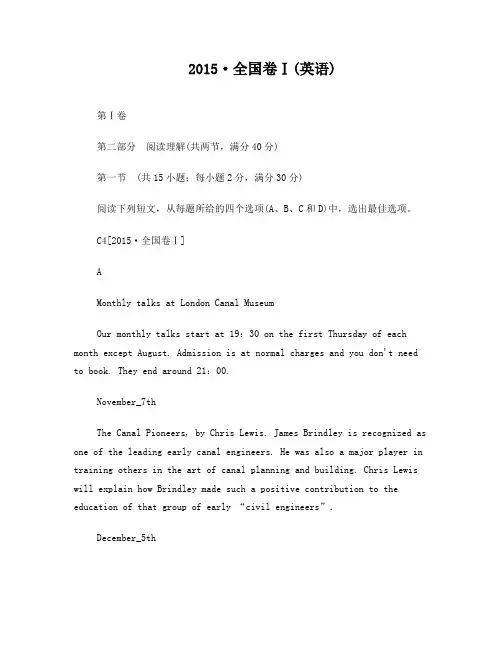
2015·全国卷Ⅰ(英语)第Ⅰ卷第二部分阅读理解(共两节,满分40分)第一节(共15小题;每小题2分,满分30分)阅读下列短文,从每题所给的四个选项(A、B、C和D)中,选出最佳选项。
C4[2015·全国卷Ⅰ]AMonthly talks at London Canal MuseumOur monthly talks start at 19:30 on the first Thursday of each month except August. Admission is at normal charges and you don't need to book. They end around 21:00.November_7thThe Canal Pioneers, by Chris Lewis. James Brindley is recognized as one of the leading early canal engineers. He was also a major player in training others in the art of canal planning and building. Chris Lewis will explain how Brindley made such a positive contribution to the education of that group of early “civil engineers”.December_5thIce for the Metropolis, by Malcolm Tucker. Well before the arrival of freezers, there was a demand for ice for food preservation and catering. Malcolm will explain the history of importing natural ice and the technology of building ice wells, and how London's ice trade grew.February_6thAn Update on the Cotswold Canals, by Liz Payne. The Stroudwater Canal is moving towards reopening. The Thames and Severn Canal will take a little longer. We will have a report on the present state of play.March_6thEyots and Aits—Thames Islands, by Miranda Vickers. The Thames has many islands. Miranda has undertaken a review of all of them. She will tell us about those of greatest interest.Online bookings:/bookMore info:/whatsonLondon Canal Museum12-13 New Wharf Road, London NI 9RT www.canalmuseum.mobiTel:020 7713 083621.When is the talk on James Brindley?A.February 6th.B.March 6th.C.November 7th.D.December 5th.22. What is the topic of the talk in February?A.The Canal Pioneers.B.Ice for the Metropolis.C.Eyots and Aits—Thames Islands.D.An Update on the Cotswold Canals.23. Who will give the talk on the islands in the Thames?A.Miranda Vickers.B.Malcolm Tucker.C.Chris Lewis.D.Liz Payne.【要点综述】此文主要介绍了伦敦运河博物馆四个月份的讲座安排。
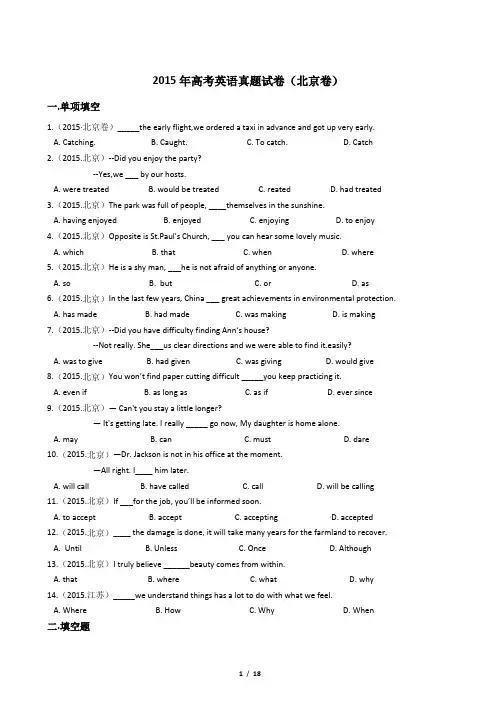
2015年高考英语真题试卷(北京卷)一.单项填空1.(2015·北京卷)_____the early flight,we ordered a taxi in advance and got up very early.A. Catching.B. Caught.C. To catch.D. Catch2.(2015.北京)--Did you enjoy the party?--Yes,we ___ by our hosts.A. were treatedB. would be treatedC. reatedD. had treated3.(2015.北京)The park was full of people, ____themselves in the sunshine.A. having enjoyedB. enjoyedC. enjoyingD. to enjoy4.(2015.北京)Opposite is St.Paul's Church, ___ you can hear some lovely music.A. whichB. thatC. whenD. where5.(2015.北京)He is a shy man, ___he is not afraid of anything or anyone.A. soB. butC. orD. as6.(2015.北京)In the last few years, China ___ great achievements in environmental protection.A. has madeB. had madeC. was makingD. is making7.(2015.北京)--Did you have difficulty finding An n‘s house?--Not really. She___us clear directions and we were able to find it.easily?A. was to giveB. had givenC. was givingD. would give8.(2015.北京)You won’t find paper cutting difficult _____you keep practicing it.A. even ifB. as long asC. as ifD. ever since9.(2015.北京)— Can't you stay a little longer?— It's getting late. I really _____ go now, My daughter is home alone.A. mayB. canC. mustD. dare10.(2015.北京)—Dr. Jackson is not in his office at the moment.—All right. I____ him later.A. will callB. have calledC. callD. will be calling11.(2015.北京)If ___for the job, you’ll be informed soon.A. to acceptB. acceptC. acceptingD. accepted12.(2015.北京)____ the damage is done, it will take many years for the farmland to recover.A. UntilB. UnlessC. OnceD. Although13.(2015.北京)I truly believe ______beauty comes from within.A. thatB. whereC. whatD. why14.(2015.江苏)_____we understand things has a lot to do with what we feel.A. WhereB. HowC. WhyD. When二.填空题15.(2015·北京)A Welcome GiftDario and his mother loved their new apartment. The living room was large enough for their piano. That night, the two of them 1 side by side at the piano. They played jazz music to celebrate their new home. The loud 2 filled the room and made them feel very happy.The next morning, 3 , their happiness disappeared. Someone had left a 4 under their door during the night. One of their neighbor had written to complain(抱怨) about the sound of the piano. Dario’s mother asked the building superintendent(管理员) if he knew anything about it. But he said that they were all 5 people and he couldn’t imagine any of them had done that. Later that morning, Dario suggested that they write a letter to their 6 and apologize for their playing.“Maybe we could go and7 everyone in person.” his mother said.“W hat if we invited them to come here for a 8 instead? Dario asked.They both loved the 9 . Over the next few days, they sent out invitations and prepared desserts 10 their guests. They decorated the apartment with streamers(彩带) and party lights.Finally, the day of the party 11 . Some guests brought presents. Others brought flowers. Some even brought desserts to 12 . One woman, Mrs. Gilbert, 13 Dario’s mother with a book of piano music by Chopin.“I heard you playing the other night,” she said. “The sounds woke me out of bed. I14 that you might play like this every night. So I wrote a short note. I hope you don’t think I disliked the playing.”Dario's mother smiled at Mrs. Gilbert. “I think maybe we15 you an apology.” she said. “I didn’t16 how late it was when we were playing. Maybe we should play some quieter music at night.“You play, you play!” Mrs. Gilbert said. “I like what you play! Just not so loud at night.”She pointed to the book she had given them. “These songs are not such17 music.”“These songs are beautiful music.” Dario’s mother said. “We will be18 to play them in the evening.”“And we won’t play so loud or late!” Dario said. He was already looking forward to19 the new music. More than that, however, he was happy to see the big smile on his mother’s face. It gave him a feeling of 20 and made him feel that they were home at last.1. A. sat B. stood C. lay D. walked2. A. voice B. ring C. music D. cry3. A. therefore B. however C. otherwise D. instead4. A. note B. poster C. bill D. report5. A. proud B. rich C. lucky D. nice6. A. neighbors B. friends C. relatives D. audience7. A. blame B. instruct C. question D. visit8. A. party B.concertC. concertD. concertE. concert9. A. experience B. idea C. performance D. action10. A. to B. with C. for D. from11. A. continued B. arrived C. passed D. finished12. A. order B. sell C. share D. advertise13. A. treated B. presented C. helped D. served14. A. promised B. admitted C. agreed D. worried15. A. give B. send C. offer D. owe16. A. realize B. remember C. understand D. accept17. A. sweet B. strange C. funny D. loud18. A. brave B. sorry C. happy D. afraid19. A. changing B. practicing C. recording D. writing20. A. equality B. freedom C. warmth D. sympathy16.(2015·北京卷)AThe Boy Made It!One Sunday, Nicholas, a teenager, went skiing at Sugarloaf Mountain in Maine. In the early afternoon, when he was planning to go home, a fierce snowstorm swept into the area. Unable to see far, he accidentally turned off the path. Before he knew it, Nicholas was lost, all alone! He didn’t have food, water, a phone, or other supplies. He was getting colder by the minute.Nicholas had no idea where he was. He tried not to panic. He thought about all the survival shows he had watched on TV.It was time to put the tips he had learned to use.He decided to stop skiing. There was a better chance of someone finding him if he stayed put. The first thing he did was to find shelter form the freezing wind and snow. If he didn’t, his body temperature would get very low, which could quickly kill him. Using his skis, Nicholas built a snow cave. He gathered a huge mass of snow and dug out a hole in the middle. Then he piled branches ontop of himself, like a blanket, to stay as warm as he could.By that evening, Nicholas was really hungry. He ate snow and drank water from a nearby stream so that his body wouldn’t lose too m uch water. Not knowing how much longer he could last, Nicholas did the only thing he could- he huddled(蜷缩) in his cave and slept.The next day, Nicholas went out to look for help, but he couldn’t find anyone. He followed his tracks and returned to the snow cave,becausewithout shelter, he could die that night. On Tuesday, Nicholas went out to find help. He had walked for about a mile when a volunteersearcher found him. After two days stuck in the snow, Nicholas was saved.Nicholas mightnot have survived this snowstorm had it not been for TV. He had often watchedGrylls’ survival show. Man vs. Wild. That's where he learned the tips that saved his life, In each episode(一期节目)of Man vs. Wild, Grylls is abandoned in a wild area and has to find his way out.When Grylls heard about Nicholas’ amazing deeds, he was super impressed that Nicholas had made it since he knew better than anyone how hard Nicholas had to work to stay alive.(1)What happened to Nicholas one Sunday afternoon?A.He got lostB.He broke his skis.C.He hurt his eyesD.He caught a cold(2)How did Nicholas keep himself warm?A.He found a shelter.B.He lighted some branches.C.He kept on skiing.D.He built a snow cave.(3)On Tuesday, Nicholas _____.A.returned to his shelter safelyB.was saved by a searcherC.got stuck in the snowD.staved where he was(4)Nicholas left Grylls a very deep impression because he _____.A.did the right things in the dangerous situationB. watched Grylls TV program regularlyC. created some tips for survivalD.was very hard-working17.(2015·北京卷)Revolutionary TV EarsTV Ears has helped thousands of people with various degrees of hearing loss hear the television clearly without turning up the volume(音量) and now it’s better and more affordable than ever! With TV Ears wireless technology, you set your own headset volume, while other TV listeners hear the television at a volume level that’s comfortable for them. You can even listen through the headset only and put the TV on mute(静音) if the situation calls for a quiet environment —maybe the baby is sleeping. Or perhaps you are the only one who is interested in listening to the TV Ears patent ed technology includes a revolutionary noise reduction car tip, not used in any other commercially available headset. This tip reduces outside noise so that television dialogue is clear and understandable. Get the technology that has proven to help the most demanding customers. That's why TV Earshas earned the trust and confidence of audiologists(听觉学家) nationwide as well as world-famous doctors.Risk Free Trial! TV Ears comes with a 30-day risk free trial.Special Offer — Now $59.95.If you’re not satisfied, return it.Money-back guarantee!Call now ! 800-123-7832(1)TV Ears helps you _____.A.improve your sleeping qualityB.listen to TV without disturbing othersC.change TV channels without difficultyD.become interested in ballgame programs(2)What makes TV Ears different from other headsets?A. It can easily set TV on mute.B.Its headset volume is adjustable.C.It has a new noise reduction car tip.D.It applies special wireless technology.(3)This advertisement is made more believable by _____.ing recommendationsB.offering reasons for this inventionC.providing statistics.D.showing the results of experiments.18.(2015·北京卷)Transparent animals let light pass through their bodies the same way light passes through a window. These an imals typically live betweenthe surface of the ocean and a depth of about 3,300 feet—as far as most light can reach. Most of them are extre mely delicate and can bedamaged by a simple touch.Sonke Johnsen, a scientist in biology, says, “These animals live through their life alone. They nevertouch anything unless they’re eating it, or unless something is eating them.”And they are as clear as glass. How does an animal become see-through? It’s trickier than you might think.The objects around you are visible because they interact with light. Light typically travels in a straight line. B ut some materials slow andscatter(散射) light, bouncing it away from its original path. Others absorb light, stopping it dead in its tracks. Both scatterin g and absorptionmake an object look different from other objects around it, so you can see it easily.But a transparent object doesn’t absorb or scatter light, at least not very much, Light can pass through it wi thout bending or stopping.That means a transparent object doesn’t look very different from the surrounding air or water. You don’t see it ----you see the thingsbehind it.To become transparent, an animal needs to keep its body from absorbing or scattering light. Living materials c an stop light because theycontain pigments(色素) that absorb specific colors of light. But a transparent animal doesn’t have pigments, so its tissues won’t absor blight. Accordingto Johnsen, avoiding absorption is actually easy. The real challenge is preventing light from scattering.Animals are built of many different materials----skin, fat, and more----and light moves through each at a diffe rent speed. Every time lightmoves into a material with a new speed, it bends and scatters.Transparent animals use different tricks to fight sc attering. Some animals aresimply very small or extremely flat. Without much tissue toscatter light, it is easier to be see--through. Others build a large, clear mass ofnon-living jelly-lie(果冻状的)material and spread themselves over it .Larger transparent animals have the biggest challenge, because they have to make all the different tissues in their bodies slow down lightexactly as much as water does. They need to look uniform. But how th ey’re doing it is still unknown. One thing is clear for these larger animals, staying transparent is an active process. When they die, they turn a non-transpare nt milky white.(1)According to Paragraph 1, transparent animals_______A.stay in groupsB.can be easily damagedC.appear only in deep oceanD.are beautiful creatures(2)The underlined word “dead” in Paragraph 3 means__________.A.silentlyB.graduallyC.regularlypletely(3)One way for an animal to become transparent is to ________.A. change the direction of light travelB.gather materials to scatter light.C.avoid the absorption of lightD. grow bigger to stop light.(4)The last paragraph tells us that larger transparent animals________.A.move more slowly in deep waterB. stay see-through even after deathC. produce more tissues for their survivalD.take effective action to reduce Light spreading19.(2015·北京卷) DTechnological change is everywhere and affects every aspect of life, mostly for the better. However, social changes are brought about by new technology are often mistaken for a change in attitudes.An example at hand is the involvement of parents in the lives of their children who are attending college. Surveys (调查) on this topicsuggests that parents today continue to be “very” or“somewhat” overlyprotective even after their children move into collegedormitories. The same surveys also indicate that the rate of parental involvement is greater today than it wasa generation ago.This is usually interpreted as a sign that today’s parents are trying to manage their children’s lives past the point where this behavior is appropriate.However, greater parental involvement does not necessarily indicate that parents are failing to let go of their “adult” children.In the context (背景) of this discussion, it seems valuable to first find out the cause of change in the case of parents’ involveme nt withtheir grown children.If parents of earlier generations had wanted to be in touch with their college-age children frequently, would thishave been possible? Probably not. On the other hand, does the possibility of frequent communication today mean that the urge to do so wasn’t present a generation ago? Many studies show that older parents - today’s grandparents - wouldhave called their children more often if the means and cost of doing so had not been a barrier.Furthermore, studies show that finances are the most frequent subject of communication between parents and their college children. The fact that college students are financially dependent on their parents is nothing new; nor are requests for more money to be sent fromhome. This phenomenon is neither good nor bad; it is a fact of college life,today and in the past.Thanks to the advanced technology, we live in an age of bettered communication. This has many implications well beyondthe role that parents seem to play in the lives of their children who have left for college.But it is useful to bear in mind that all such changes come from the technology and not some imagined desire byparents to keep their children under their wings.(1)The surveys inform us of ______A. the development of technologyB.the changes of adult children’s behaviorC. the parents’ over-protection of their college childrenD.the means and expenses of students’ communication(2)The writer believes that ______.A.parents today are more protective than those in the pastB.the disadvantages of new technology outweigh its advantegesC.technology explains greater parental involvement with their childrenD.parents' changed attitudes lead to college children's delayed independence(3)What is the best title for the passage?A.Technology or AttitudeB. Dependence or IndependenceC.Family Influence or Social ChangesD.College Management or Communication Advancement(4)Which of the following shows the development of ideas in this passage?A.B.C.D.E.三.写作题20.(2015·北京卷)假如你是红星中学学生李华。
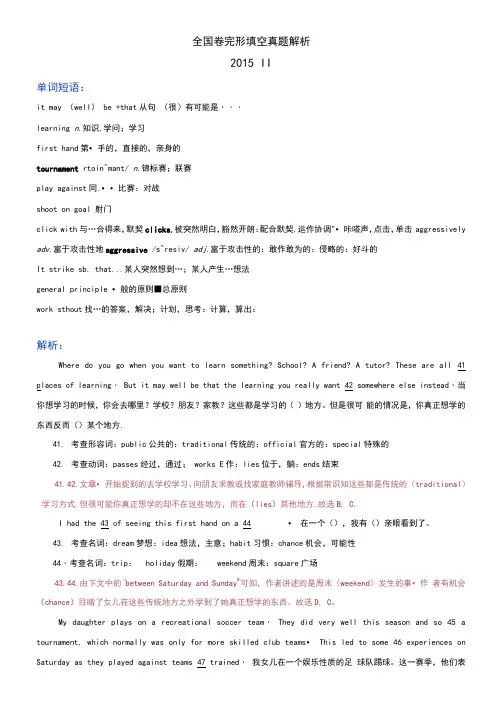
全国卷完形填空真题解析2015 II单词短语:it may (well) be +that从句(很〉有可能是・・・learning n.知识,学问;学习first hand第•手的,直接的,亲身的tournament rtoin^mant/ n.锦标赛;联赛play against同.••比赛:对战shoot on goal 射门click with与…合得来,默契clicks.被突然明白,豁然开朗:配合默契,运作协调"•咔嗒声,点击,单击aggressively adv.富于攻击性地aggressive /s^resiv/ adj.富于攻击性的:敢作敢为的:侵略的:好斗的It strike sb. that...某人突然想到…;某人产生…想法general principle •般的原则■总原则work sthout找…的答案,解决;计划,思考:计算,算出:解析:Where do you go when you want to learn something? School? A friend? A tutor? These are all 41 places of learning・ But it may well be that the learning you really want 42 somewhere else instead・当你想学习的时候,你会去哪里?学校?朋友?家教?这些都是学习的()地方。
但是很可能的情况是,你真正想学的东西反而()某个地方.41.考查形容词:public公共的:traditional传统的:official官方的:special特殊的42.考查动词:passes经过,通过; works E作:lies位于,躺:ends结束41.42.文章•开始捉到的去学校学习、向朋友求教或找家庭教师辅导,根据常识知这些都是传统的(traditional)学习方式.但很可能你真正想学的却不在这些地方,而在(lies)其他地方.故选B, C.I had the 43 of seeing this first hand on a 44 •在一个(),我有()亲眼看到了。
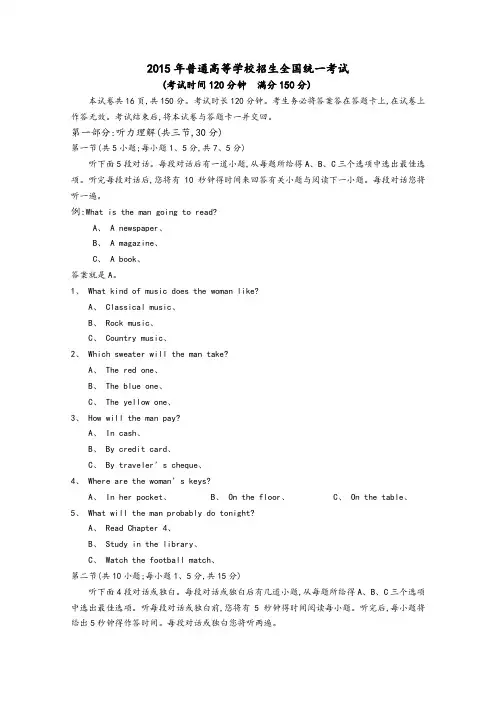
2015年普通高等学校招生全国统一考试(考试时间120分钟满分150分)本试卷共16页,共150分。
考试时长120分钟。
考生务必将答案答在答题卡上,在试卷上作答无效。
考试结束后,将本试卷与答题卡一并交回。
第一部分:听力理解(共三节,30分)第一节(共5小题;每小题1、5分,共7、5分)听下面5段对话。
每段对话后有一道小题,从每题所给得A、B、C三个选项中选出最佳选项。
听完每段对话后,您将有10秒钟得时间来回答有关小题与阅读下一小题。
每段对话您将听一遍。
例:What is the man going to read?A、 A newspaper、B、 A magazine、C、 A book、答案就是A。
1、 What kind of music does the woman like?A、 Classical music、B、 Rock music、C、 Country music、2、 Which sweater will the man take?A、 The red one、B、 The blue one、C、 The yellow one、3、 How will the man pay?A、 In cash、B、 By credit card、C、 By traveler’s cheque、4、 Where are the woman’s keys?A、 In her pocket、B、 On the floor、C、 On the table、5、 What will the man probably do tonight?A、 Read Chapter 4、B、 Study in the library、C、 Watch the football match、第二节(共10小题;每小题1、5分,共15分)听下面4段对话或独白。
每段对话或独白后有几道小题,从每题所给得A、B、C三个选项中选出最佳选项。
2015年普通高等学校招生全国统一考试(课标全国卷II)A我的彩色电视给我带来除了头疼以外没有任何其他的东西。
大约一年多前,我让我的亲戚们把送我的生日礼物从一大堆不合身的衣服换成了钱,我才有能力买下了它。
但是我上当了,一位售货员让我买了一个停产的型号。
过了一天后,当我在报纸上看到该电视的广告,售价比我买的时候还便宜了75美元时,这才意识到自己上当了。
这台电视在我刚买回家时真是太棒了,所以我会一直开着,直到夜里各大电视台的节目都停播为止。
幸运的是,我没有通宵播放电影的频道,否则我就整夜都不会睡了。
然后我发现它开始出现静电噪音的问题。
由于某种原因,当某些电视节目被转到商业广告时,就会出现几秒很大的噪声。
这种噪声逐渐地出现在节目当中。
为了消除它,我不得不换到别的频道,然后再换回来。
有时这个方法还不管用,我又不得不将这台电视抱起摇晃来消除噪声。
通过摇晃电视都我的手臂开始长出了肌肉。
当这两种方法都不能消除静电噪音时,我只能无助地坐在那里,等待着它自动消失。
最终,我用拳头打了这台电视,它便彻底不工作了。
拿它去修理铺修花了我62美元,现在它又恢复正常工作了,但我一直预感着它还会出现更多问题。
B你的房子可能对你的体重有影响。
专家称,你设计自己家的方式会在你长肉还是减重上起到重要的作用。
你可以让家里的环境对你有利而不是不利于你。
下面是把你家变成你节食计划一部分的一些方法。
拉开窗帘或打开灯。
黑暗的环境更容易鼓励过度饮食,因为人们在灯光昏暗的地方很少会难为情,所以更可能吃下大量食物。
若你的家没有足够的自然光,那就多装一些灯并让灯光充满整个家。
注意一下颜色。
研究表明,暖色调会增强我们的食欲。
在一项研究中,在蓝色房间中的人吃掉的食物比在黄色或红色房间中的人少了33%。
像黄色等暖色调会使食物变得更可口,而冷色调会减少我们的饥饿感。
因此,当到了重新粉刷家里的时候,要选择蓝色。
不要忘记钟表或收音机。
与那些吃饭匆忙的人相比,吃得慢的人每餐会少摄入70卡路里。
2015年普通高等学校招生全国统一考试(课标全国卷II)英语第二部分阅读理解A我的彩色电视给我带来的只有头疼。
大约一年多前,我让我的亲戚们把送我的生日礼物从一大堆不合身的衣服换成了钱,我这才有能力买下了它。
但我上了一位售货员的当,买了一个停产的型号。
一天后,当我在报纸上看到该电视的广告,售价比我买的还便宜了75美元,这才意识到自己上当了。
这台电视在我刚买回家时真是太棒了,所以我会一直开着,直到夜里各大电视台的节目都停播为止。
幸运的是,我没有通宵播放电影的频道,否则我就整夜都不会睡了。
然后它就开始出现静电噪音的问题。
由于某种原因,当某些电视节目被转到商业广告时,就会出现几秒很大的噪声。
逐渐地,就连节目中也会出现这个噪声,为了消除它,我不得不换到别的频道,然后再换回来。
这个方法有时还不管用,我又不得不将这台电视抱起摇晃来消除噪声。
摇晃电视这活都开始让我的手臂长出肌肉了。
当这两种方法都无法消除静电噪声时,我只能无助地坐在那里,等待着它自动消失。
最终,我用拳头打了这台电视,它便彻底不工作了。
拿它去修理铺修花了我62美元,现在它又恢复正常工作了,但我一直预感着它还会出现更多麻烦。
B你的房子可能对你的体重有影响。
专家称,你设计自己家的方式会左右你是长肉呢还是减重。
你可以让家里的环境有利于你,而非不利于你。
下面是一些将你的家变成你节食计划一部分的方式。
拉开窗帘打开灯。
黑暗的环境更容易鼓励过度饮食,因为人们在灯光昏暗的地方难为情的情绪也会减少,所以更可能吃下大量食物。
若你的家没有足够的自然光,那就多装一些灯,让灯光充斥整个家。
注意颜色。
研究建议,暖色会促进我们的食欲。
在一项研究中,在蓝色房间中的人,吃掉的食物比在黄色或红色房间中的人少了33%。
黄色等暖色会让食物变得更可口,而冷色会减少我们的饥饿感。
因此,当该重新粉刷家里时,选择蓝色。
不要忘记钟或收音机。
与那些吃饭匆忙的人相比,吃得慢的人每餐会少摄入70卡路里。
2015年普通高等学校招生全国统一考试英语本试卷分第Ⅰ卷(选择题)和第Ⅱ卷(非选择题)两部分。
考试结束后,将本试卷和答题卡一并交回。
第Ⅰ卷注意事项:1. 答第Ⅰ卷前,考生务必将自己的姓名、准考证号填写在答题卡上。
2. 选出每小题答案后,用铅笔把答题卡上对应题目的答案标号涂黑。
如需改动,用橡皮擦干净后,再选涂其他答案标号。
不能答在本试卷上,否则无效。
第一部分听力(共两节,满分30分)做题时,先将答案标在试卷上。
录音内容结束后,你将有两分钟的时间将试卷上的答案转涂到答题卡上。
第一节(共5小题;每小题1.5分,满分7.5分)听下面5段对话。
每段对话后有一个小题,从题中所给的A、B、C三个选项中选出最佳选项,并标在试卷的相应位置。
听完每段对话后,你都有10秒钟的时间来回答有关小题和阅读下一小题。
每段对话仅读一遍。
例:How much is the shirt?A. £19.15B. £9.18C. £9.15答案是C。
1.What time is it now?A. 9:10B. 9:50C. 10:002.What does the woman think of the weather?A. It’s niceB. It’s warmC. It’s cold3.What will the man do?A. Attend a meetingB. Give a lectureC. Leave his office4.What is the woman’s opinion about the course?A. Too hardB. Worth takingC. Very easy5. What does the woman want the man to do ?A. Speak louderB. Apologize to her.C. Turn off the radio.第二节(共15小题;每小题1.5分,满分22.5分)听下面5段对话或独白。
绝密★启用前: 2015 年 6 月 8 日 15:002015 年一般高等学校招生全国一致卷英语本试卷分第Ⅰ卷(选择题)和第Ⅱ卷(非选择题)两部分。
考试结束后,将本试卷和答题卡一并交回。
第Ⅰ卷注意事项:1.答第Ⅰ卷前,考生务必然自己的姓名、准考证号填写在答题卡上。
2.选出每题答案后,用铅笔把答题卡上对应题目的答案标号涂黑。
如需改动,用橡皮擦干净后,再选涂其他答案标号。
不能够答在本试卷上,否则无效。
第一部分阅读理解(共两节,满分 40 分)第一节(共 15 小题:每题 2 分,满分 30 分)阅读以下短文,从每题所给的四个选项( A、B、C 和 D)中,选出最正确选项,并在答题卡大将该项涂黑。
AMy color television has given me nothing but a headache. I was able to buyit a little over a year ago because I had my relatives give memoneyfor my birthday instead of a lot of clothes that wouldn’t fit.I let a salesclerk fool me intobuying a discontinued model. I realized this a day late, when I saw newspaper advertisements for the set at seventy-five dollars less than I had paid. The set worked so beautifully when I first got it home that I would keep it on untilstations signed off for the night. Fortunately, I didn ’t got any channels showing all-night movies or I would never have gotten to bed.Then I started developing a problem with the set that involved static (静电)noise.For some reason,when certain shows switched into a commercial, a loud noise would sound for a few seconds. Gradually,this noise began to appear during a show, and to get rid of it, I had to change to another channel and then changeit back. Sometimes this technique would not work, and I had to pick up the setand shake it to remove the sound. I actually began to build up my arm muscles(肌肉) shaking my set.When neither of these methods removed the static noise, I would sit helplessly and wait for the noise to go away. At last I ended up hitting the set with myfist, and it stopped working altogether.My trip to the repair shop cost me $62, and the set is working well now, but I keep expecting more trouble.1.Why did the author say he was fooled into buying the TV set?A.He got an older model than he had expected.B.He couldn ’t return it when it was broken.C.He could have bought it at a lower price.D. He failed to find any movie shows on it.of the following can best replace t he phrase ”signed off”in Paragraph 1?A. ended all their programsB. provided fewer channelsC. changed to commercialsD. showed all-night movies3.How did the author finally get his TV set working again?A.By shaking and hitting it.B.By turning it on and off.C.By switching channels.D.By having it repaired.4.How does the another sound when telling the story ?A. CuriousB. AnxiousC. CautiousD.HumorousBYour house may have an effect on your figure. Experts say the way you designyour home could play a role in whether you pack on the pounds or keep them off.You can make your environment work for you instead of against you. Here are someways to turn your home into part of diet plan.Open the curtains and turn up the lights. Dark environments are more likelyto encourage overeating, for people are often less self-conscious(难为情)when they ’re in poorly lit places-and so more likely to eat lots of food. If yourhome doesn’t have enough window l ight, get more lamps and flood the place with brightness.Mind the colors. Research suggests warm colors fuel our appetites. In onestudy, people who ate meals in a blue room consumed 33 percent less than thosein a yellow or red room. Warmcolors like yellow makefood appear more appetizing, while cold colors make us feel less hungry. So when it’s time to repaint, go blue.Don’t forget the clock-or the radio. People who eat slowly tend to consumeabout 70 fewer calories(卡路里)per meal than those who rush through their meals. Begin keeping track of the time, and try to make dinner last at least 30 minutes, And while you ’re at it, actually sit down to eat. If you need some help slowingdown, turn on relaxing music. It makes you less likely to rush through a meal.Downsize the dishes, Big serving bowls and plates can easily make us fat. Weeat about 22 percent more when using a 12-inch plate instead of a 10-inch plate.When we choose a large spoon over a smaller one ,total intake(摄入)jumps by 14 percent. And we’ll pour about 30 percent more liquid into a short, wide glassthan a tall, skinny glass.5.The text is especially helpful for those who care about_______.A.their home comfortsB.their body shapeC.house buyingD.healthy diets6.A home environment in blue can help people_________.A.digest food betterB.reduce food intakeC.burn more caloriesD.regain their appetites7.What are people advised to do at mealtimes?A.Eat quickly.B.Play fast music.e smaller spoons.D.Turn down the lights.8.What can be a suitable title for the test?A.Is Your House Making You Fat?B.Ways of Serving DinnerC.Effects of Self-ConsciousnessD.Is Your Home Environment Relaxing?CMore student than ever before are taking a gap-year (间隔年)before going to university.It used to be called the “year off ” between school and university. The gap-year phenomenon originated (起源) with the months left over to Oxbridge applicants between entrance exams in November and the start of the next academic year.This year, 25,310 students who have accepted places in higher educationinstitutions have put off their entry until next year, according to statisticson university entrance provided by University and College AdmissionsService(UCAS).That is a record % increase in the number of students taking a gap year. Tony Higgins from UCAS said that the statistics are good news for everyone in higher education. “Students who take a well-planned year out are more likely to besatisfied with, and complete, their chosen course. Students who take a gap yearare often more mature and responsible,” he said.But not everyone is happy. Owain James, the president of the National Unionof Students(NUS), argued that the increase is evidence of student had ship–young people are being forced into earning moneybefore finishing their education. “New students are now aware that they are likely to leave university up to£15,000 in debt. It is not surprising that more and more students are taking agap year to earn money to support their study for the statistics show thatincreases over 40%of students are forced to work during term time and the figure to 90%during vacation periods, ” he said.9.What do we learn about the gap year from the text?A.It is flexible in length.B.It is a time for relaxation.C.It is increasingly popular.D.It is required by universities.10.According to Tony Higgins,students taking a gap year______.A.arc better prepared for college studiesB.know a lot more about their future jobsC.are more likely to leave university in debtD.have a better chance to enter top universities11.How does Owain James feel about the gap-year phenomenon?A.He's puzzled.B.He's worried.C.He's surprised.D. He's annoyed.12.What would most students do on their vacation according to NUS statistics?A.Attend additional courses.B.Make plans for the new term.C.Earn money for their education.D.Prepare for their graduate studies.DChoose Your One-Day ToursTour A— Bath & Stonehenge including entrance fees to the ancient Romanbathrooms and Stonehenge —£until 26 March and£39 thereafter.Visit the city with over 2,000 years of history and Bath Abbey, the Royal Crescent and the Costume Museum.Stonehenge is one of the world ’s most famous prehistoric monuments dating back over 5,000 years.Tour B — Oxford & Stratford including entrance fees to the University St Mary’s Church Tower and Anne Hathaway's house一32 until 12 March and 36 thereafter. Oxford: Inclu des a guided of England’s oldest university city and colleges.Look over the “city of dreaming spires( 尖顶 ) ”form St Mary’s Church Tower. Stratford: Includes a guided tour exploring much of the Shakespeare wonder.Tour C—Windsor Castle & Hampton Court including entrance fees to Hampton Court Palace —£34 until March and£37 thereafter.Includes a guided tour of Windsor and Hampton Court, Henry Mill ’s favorite palace. Free time to visit Windsor Castle (entrance fees not included). With 500 yearsof history, Hampton Court was once the home of four Kings and one Queen. Nowthis former royal palace is open to the public as a major tourist attraction. Visitthe palace and its various historic gardens, which include the famous maze(迷宫)where it is easy to get lost!Tour D —Cambridge including entrance fees to the Tower of Saint Mary the Great —£33 until18March and£37thereafter.Includes a guided tour of Cambridge,the famous university town, a nd the gardens of the18th century.13.Which tour will you choose if you want to see England’s oldest university city?A. Tour AB. Tour BC. Tour CD. Tour D14.Which of the following tours charges the lowest fee on17 March?A. Windsor Castle& Hampton Court.B. Oxford&StratfordC. Bath&Stonehenge.D. Cambridge.15. Why is Hampton Court a major tourist attraction?A. It used to be the home of royal families.B. It used to be a well-known mazeC. It is the oldest palace in BritainD. It is a world-famous castle.第二节(共 5 小题:每题 2 分,满分 10 分)依照短文内容,从短文后的选项中选出能填入空白处的最正确选项。
2015年高考英语全国卷Ⅰ阅读理解D 翻译
Conflict is on the menu tonight at the café La Chope. This evening, as
on every Thursday night, psychologist Maud Lehanne is leading two of
France‘s favorite pastimes, coffee drinking and the ―talking cure‖. Here
they are learning to get in touch with their true feelings. It isn‘t always
easy. They customers-some thirty Parisians who pay just under $2 (plus
drinks) per session-care quick to intellectualize (高谈阔论),slow to open
up and connect. ―You are forbidden to say ‗one feels,‘ or ‗people
think‘,‖Lehane told them. ―Say ‗I think,‘ ‗Think me‘.‖
A café society where no intellectualizing is allowed? It couldn‘t seem
more un-French. But Lehanne‘s psychology café is about more than
knowing oneself: It‘s trying to help the city‘s troubled neighborhood
cafes. Over the years, Parisian cafes have fallen victim to changes in the
French lifestyle-longer working hours, a fast food boom and a younger
generation‘s desire to spend more time at home. Dozens of new theme
cafes appear to change the situation. Cafes focused around psychology,
history, and engineering are catching on, filling tables well into the
evening.
The city‘s psychology cafes, which offer great comfort, are among the
most popular places. Middle-aged homemakers, retirees, and the
unemployed come to such cafes to talk about lover, anger, and dreams
with a psychologist. And they come to Lehance‘s group just to learn to
精选文库
—
2
say what they feel. There‘s a strong need in Paris for communication,
says Maurice Frisch, a cafe La Chope regular who works as religious
instructor in a nearby church. ―People have few real friends. And they
need to open up‖ Lehanne says she‘d like to see psychology cafes all over
France. ―If people had normal lives, these cafes would‘t exist‖, she
says,‖If life weren‘t a battle, people wouln‘t need a special place just to
speak.‖ But them, it wouldn‘t be France.
矛盾在今晚咖啡馆LC的菜单上。这个晚上,就像每个周四的晚
上,心理学家莫得·勒汉尼正在过着法国最受欢迎的两种消遣,喝咖
啡和“倾诉疗法”。在这里,他们学着了解自己的真实情绪。这是不容
易的。这些顾客---30多个巴黎人,每一疗程只支付不到两美元(含
饮品)---很快就高谈阔论,慢吞吞的打开心扉,产生共鸣。“你不能
说‘某人觉得’,或者‘人们认为’”勒汉尼告诉他们“要说‘我认为’‘想想
我’”。
一个不允许人们高谈阔论的咖啡社群?这似乎太不像法国人了。
但是勒汉尼的心理学咖啡馆不只是了解自己:它试图帮助那些陷入困
境的当地咖啡馆。多年以来,巴黎的咖啡馆成了法国生活方式变化的
受害者。更长的时间工作,快餐的蓬勃发展和年轻一代对宅在家里的
渴望。几十个新主题咖啡馆的出现似乎改变了这种情况。这些咖啡馆
以心理学、历史学为焦点,工程学也在逐渐流行起来,每晚都爆满。
这座城市的心理学咖啡馆非常舒适,是最受欢迎的地方之一。人
到中年的主妇,退休人员和无业人员来到这样的咖啡馆里,与一名心
精选文库
—
3
理学家谈论爱人,愤怒和梦想。他们参加勒汉尼的团体只是为了说出
他们的感受。一个咖啡馆的常客毛瑞斯是附近教堂的宗教导师。他说,
在巴黎,对沟通的需求很强烈。“人们很少有真正的朋友,他们需要
敞开心扉”勒汉尼说。她想看到心理学咖啡馆开遍法国。“如果人们又
正常的生活,那么心理学咖啡馆就不会存在了”,她说,“如果生活不
是一场战役, 那么人们就不需要一个地方只为说话了。”但是那样的
话,巴黎就不是巴黎了。